Lynch/Rivette: In Dreams
The ongoing series “Lynch/Rivette” at the Film Society of Lincoln Center pairs films by David Lynch and Jacques Rivette. Last week, the Film Society held its latest Free Talk, between Village Voice senior film critic Melissa Anderson and FSLC Director of Programming Dennis Lim, author of the new book The Man from Another Place about Lynch and his work. Below is a condensed transcript of their conversation.
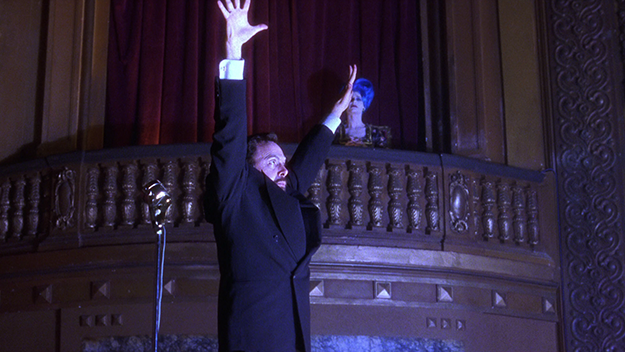
Mulholland Drive
Melissa Anderson: It is thrilling to welcome you to this conversation with Mr. Dennis Lim who has written an extraordinary critical biography of Dennis—oh, excuse me, David Lynch.
Dennis Lim: It is actually about me.
MA: Already the bifurcation and the merging of identities has begun in the introduction. Dennis’s book is a model of extremely elegant elucidation. He was my editor at the Village Voice from 2000 to 2005. I learnt a tremendous amount from him, and in the decade and a half that we have been friends, we have shared a nearly all-consuming passion for David Lynch and his films. And one of my favorite anecdotes that really illustrates Dennis’s ardor for David Lynch was when you were at the Cannes Film Festival in 2001, where Mulholland Drive had its world premiere. You saw it—and then immediately returned to somewhere in the Palais de Festivals to see it again.
DL: Thank you, Melissa. I will also say Melissa is the newly appointed Village Voice senior film critic. This is a very exciting development for film culture in New York City—Melissa has a weekly column which she’ll be focusing on repertory programming. She wrote a great piece about “Lynch/Rivette,” which I co-programmed with Dan Sullivan. Thank you for doing this. No one else I’d rather do it with.
MA: It is an honor.
DL: Mulholland Drive is probably one of the very few films that I’ve watched twice within the first 24 hours. I felt compelled, like I had to go back and figure it out. And that was one of the main compulsions for writing this book. I had been invited to submit a proposal for a critical biography on a filmmaker. Lynch came to mind immediately. He is to me an inexhaustible subject.
MA: So when you were trying to map out a sensibility of a very singular artist, how difficult was that? Especially when the term “Lynchian” has almost become completely evacuated of meaning. If it’s applied to such preposterous examples as Susan Boyle, Louis Vuitton, or perhaps, most absurdly, Quentin Tarantino, does the descriptor still have a potency?
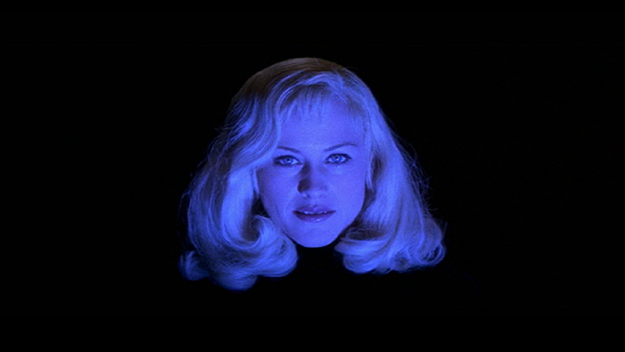
Lost Highway
DL: That was a question I was trying to work through in writing the book. I saw it more like writing about a sensibility, or the anatomy of a sensibility. I read other biographical texts on Lynch and didn’t feel I needed to do a year-by-year chronology of what happened. So this idea of the Lynchian was always the starting point. It is so all-purpose and so readily applicable to so many things, but it’s also evocative of something. The fact that it even exists—that somebody who made 10 feature films, some of them very weird and very uncommercial—means something in the popular culture worthy of investigation.
MA: And you’ve interviewed Lynch at least twice?
DL: Three times, and once was in person for Mulholland Drive.
MA: Was it during that interview that you asked him directly to define “Lynchian”?
DL: Yeah, I was very naïve. [Laughter] I think that he was not pleased by that question. The line that I quote in the book was something like: “That’s like, ‘What’s a donut?’ Keep your eye on the donut and not the hole.” That’s a question that focuses on the hole and not the donut. I knew he was resistant to over-interpretation of his work. I brought a book that Slavoj Zizek had just published on Lost Highway to give to Lynch, which I’m sure he was absolutely horrified by. I spend a bit of time with this in the book, too: Lynch’s language, the way that he talks about his work, seems determined to thwart interpretation, but that in itself seemed worthy of exploration. I did not interview him again for the book because he didn’t want to do another interview. He’s not really a big fan of book projects on him, but he was very supportive in the sense that he told many people, like Fred Elmes and Peter Deming, to feel free to talk to me. And I totally understand, especially given his relationship with language and interpretation. I read almost every interview I could find and they are so repetitive. Chris Rodley’s book is great. It’s still a definitive text.
MA: Speaking of the Chris Rodley book, Lynch on Lynch, there’s a line which he uses which is really quite powerful: “Words are Mulholland Drive’s enemy.” And if that’s the case, your work is a work of critical interpretation—did that pose particular challenges, or was it in some ways oddly liberating?
DL: I would say both. It’s hard not to have that ringing in your head when you’re writing about Lynch. There’s a quote I used when I was crafting an excerpt that ran in The New Yorker: “Talking is really dangerous.” He has this almost superstitious view: don’t talk about the world, don’t explain its power. And it became clear to me that it’s not possible to explain away the power of Lynch’s films. I still am completely excited and captivated and surprised even at films I’ve seen many, many times. And you are somebody who’s watched Mulholland Drive in record-breaking numbers. [Laughter]
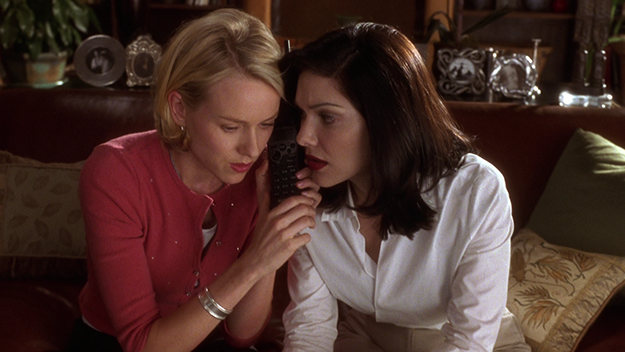
Mulholland Drive
MA: At least 30 times. And it’ll be 31 [with the FSLC screening].
DL: It’s interesting—what does that say about the work, that it’s so difficult to demystify? I do agree that words are Lynch’s enemy, in the sense that in writing the book I found it very difficult to write about Lynch. His own book, Catching the Big Fish, which is about his creative process and about meditation, is fascinating but I wouldn’t say it’s a revealing book. A lot of the writing on Lynch is very vague. There’s something about his work that encourages vague writing because the sensations that he evokes are so large and uncontainable and possibly vague. I kept coming back to my relationship with what was on the screen—how the experience of watching Lynch’s great films is so specific. Why are the films so potent? What are they tapping into in us?
MA: I’m going to quote one observation in your book that gets at just how vast or how uncontainable the responses he can trigger are: “In Lynch’s world, the mere fact of existence and of consciousness can be cause for terror.” It does not get any more irreducible than that. Just being in the world is totally destabilizing.
DL: Isn’t it?
MA: Yes. This very experience is leaving me unhinged. With that in mind, can you tell us about your very first encounter with Lynch, and did it terrify you?
DL: It scarred me for life probably. [Laughter] Blue Velvet—I was probably too young.
MA: How old?
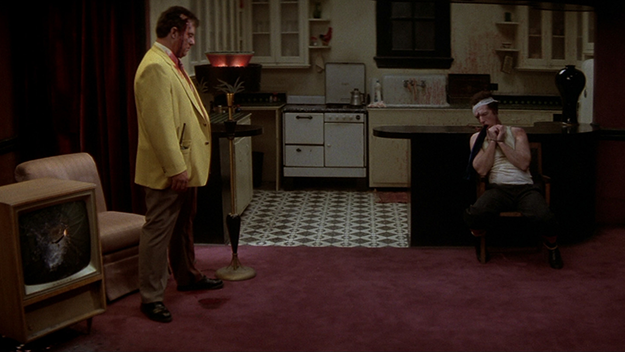
Blue Velvet
DL: Thirteen or 14. It was on VHS, and the weird thing about the VHS of Blue Velvet is that a good third of the image is missing. It’s pan-and-scan, and it’s a widescreen film. Watching it and not being able to explain what was going on—the feeling that you didn’t quite grasp it…
MA: Were you watching this by yourself?
DL: Yes. It’s not even my favorite Lynch film, but it’s obviously significant as my first gateway. Besides being exciting and frightening, it really puts you in the place of Jeffrey [Kyle MacLachlan’s character]. It’s a coming-of-age film that tries to make you endure that rite of passage. You’re supposed to be excited, horrified, confused. And for me, confusion is a defining experience of watching Lynch. The fact that Blue Velvet made such an impression on me has always been a touchstone: knowing how important it is not to be afraid of confusion. Confusion is a really productive state to be in. There are things to figure out.
MA: This idea of confusion is interesting because you were talking about how a lot of books about Lynch are marked by their vagueness.
DL: There have been a lot of books published on Lynch, and I do get a lot out of them. There are many, many academic studies of Lynch which to me seem overly narrow—to apply one lens to the work. But I was writing a book for a popular audience and I wanted to insist that you can apply different lenses. I read all the reviews of the films as they came out, and there was just a lot of vagueness, and the line that you constantly defer to: “He’s the weirdo who makes the weird films.” And a large part of that is also the persona of Lynch, which is something I got into and something that’s been cultivated. I think that he’s genuinely an eccentric guy, but he’s also been very good and very smart at performing in public. How that feeds into the reception of the work is interesting.
MA: In his interview with Chris Rodley he did say something about Mulholland Drive that is quite extraordinary: “I think most people know what Mulholland Drive means to them, but they don’t trust it.” And this is something that you discuss in your book: with Mulholland Drive, and Twin Peaks in 1990, the most zealous fandom was about parsing the minutiae, looking for clues. We’re not here to question anybody’s fandom, but it can seem to be a way of not letting very emotionally profound works really penetrate you.
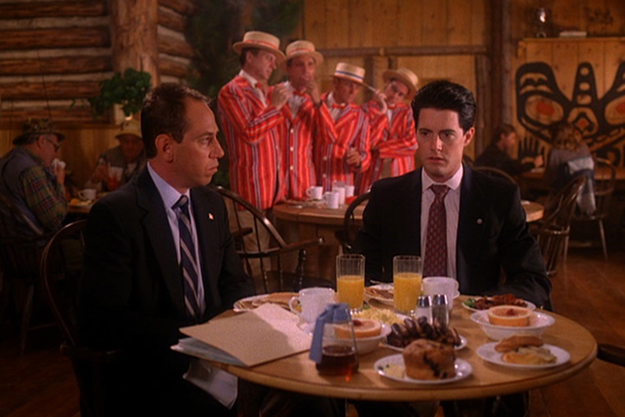
Twin Peaks
DL: I wasn’t so interested in symbolist readings of the film like, what does the blue key in Mulholland Drive mean? What does the horse mean in Twin Peaks? There are tons of websites devoted to parsing all of that, and it’s great and I looked at a lot of them. But I didn’t even introduce any of those into the book. Because I kind of don’t really care. I’m not inclined to read films, or any narrative works, that way. And Lynch would prefer them to be as open-ended as possible. He would never say, “Oh, yes, your interpretation is right.”
With Twin Peaks, obviously there was a solution, so to speak, to the murder mystery. And Mulholland Drive is a puzzle that more or less adds up. But when Lynch tries something like Inland Empire—which does not in any easy or obvious way add up, which is also full of clues and can be pieced together, and is not linear—I think he loses some people. Even with something like Lost Highway, which is a fairly airtight film narratively, people were completely baffled, if you look at the reviews. People like the puzzle aspect of some of the films, but I think they’re also a bit pissed off when there are no clear solutions.
MA: Both you and I have been compulsive re-watchers of Lynch, and you remark in your book that what united the fans of Twin Peaks was that they wanted to continue to exist in that world. Are there any other directors working today who are as skilled in creating these universes that are simultaneously deranged and inviting, that we want to inhabit or re-enter time and time again?
DL: Rivette. And today, Apichatpong Weerasethakul is for me a believer in stories as worlds to inhabit. There’s something very Lynchian about his films too. I know for a fact he’s a big Lynch fan.
MA: And with Jacques Rivette, who is best known as one of the architects of the French New Wave, you could think on the surface what could he possibly have in common with David Lynch? But you and Dan Sullivan have put together this very ingenious program where Lynch and Rivette are in conversation with each other. Why did you decide to bring these two directors together?
DL: I was talking to Dan, having finished the book, and thinking we should do something on Lynch. I actually wrote to Lynch’s office, and they said, he can’t participate, he’s going to be busy for two years with Twin Peaks. So it was unlikely that we’d get David out to do a retrospective, and having been in Lynch’s world for a year, I also wanted maybe to step out of it. There was something to trying to talk about Rivette’s spirit and where it resides today. To me, Lynch is the lost kindred spirit in some way. Not a whole lot has been made of this connection. We came up with several pairings that made sense. These are not definitive—there are not going to be one-on-one correspondences. If you see Duelle and Lost Highway, you’re not going to be saying, “Lynch had Duelle in mind.” Lynch hasn’t probably even heard of Duelle. But we wanted these double bills to be open and very suggestive. Some of them have plots that are overlapping, and certain motifs that recur and are mirrored in the films. And some of them are paired more for the mood.
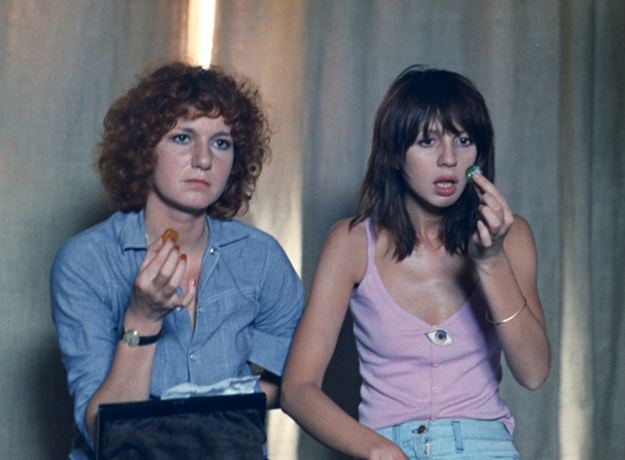
Celine and Julie Go Boating
MA: All seven of the couplings in the series are fascinating. I watched several back to back, and it is amazing how many themes come to the surface. But I think that the most fruitful pairing is Celine and Julie Go Boating, which Rivette made in 1974 and which many consider his masterpiece or perhaps his most accessible work, with Mulholland Drive. Where they have the most evocative connection is each director’s relationship to the stage. As you point out in your book, the stage is always a very charged space for Lynch, and it appears in most of his work. It’s definitely there in Blue Velvet, it’s where Dorothy Vallens performs.
DL: It’s even in Eraserhead inside the radiator. So from the very beginning there is a stage. The Elephant Man has a stage.
MA: And in Mulholland Drive, perhaps one of the greatest and most terrifying scenes set in a theater occurs in Club Silencio. And we’ll juxtapose that [in a clip] with a scene in a rinky-dink cabaret in Celine and Julie Go Boating where Juliet Berto plays Celine, a magician. She’s being watched by the woman who will become her partner in crime and who will help her solve a mystery in a house—much like Betty and Rita do in Mulholland Drive. But the stage in Celine and Julie is much more playful and goofy, although in other works in Rivette’s corpus, specifically Out 1, the stage is a place of psychodrama, regression, terror, and also a kind of a hatching ground for all kinds of unsolvable conspiracies.
The other connection I want to mention between Celine and Julie Go Boating and Mulholland Drive is that although the directors work very differently, they have a similar origin. For Rivette, when he was making the film, the starting point was the fact that the two main actresses were friends. And that’s all they needed. He put them together—Juliet Berto and Dominique Labourier—and had them largely improvise most of the three-hour movie. Lynch has never really worked with improvisation. Maybe in Inland Empire.
DL: It’s improvisatory in structure, but he wrote everything. Improvisatory in the sense that he didn’t know what he was doing, but scene by scene it was written.
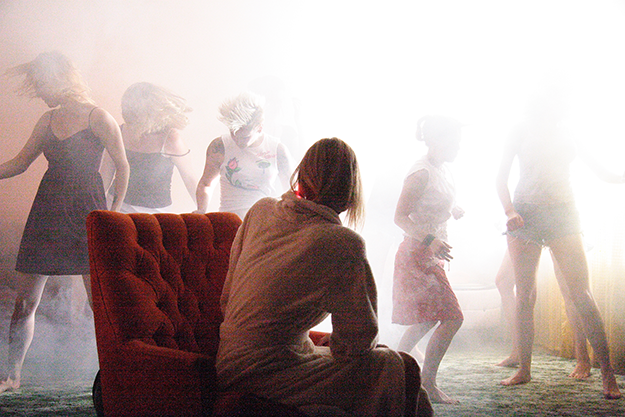
Inland Empire
MA: But for Mulholland Drive what brought the amazing actresses, Naomi Watts and Laura Elena Harring, together, was simply informal conversations that he had with them. And looking at their headshots.
DL: Casting by headshots is something he’s always done.
MA: It’s amazing that leaving so much up to chance and intuition would generate these extraordinary films. Going back to this idea of compulsive re-viewing and living in a film’s world, that Silencio scene in Mulholland Drive will always make me weep. Because I know that the beautiful romance between Betty and Rita is about to end.
DL: And I think that’s what the stage is for both Lynch and Rivette, in some ways. It’s a place where they call attention to certain illusions and to their fragility. I think that’s what those scenes are about. Even in Rivette, in the playfulness of the scene you sense an alternate reality intruding. There’s a common sense of these illusions that you need to believe in, whether it’s…
MA: Well, love or movies, as you point out.
DL: Or the stories we tell ourselves about anything. And what lies beneath these constructions, these illusions. And this very scary abyss.
[Audience question about TM (Transcendental Meditation), which Lynch practices]
DL: It’s something that I try to talk about in one chapter of the book. I’m not an expert on TM, but there’s a lot of overlap with Hindu thought and certain ideas about consciousness and transcendence. All those things you can see, if you want to, in Lynch’s films that are set in parallel universes. Inland Empire is maybe the most overt one, where the spiritual cosmology is most readily apparent. The key to TM is a repetition of a mantra, and the use of repeated language in Lynch is interesting. There are these phrases that pop out like mantras in his films: like “This is the girl” in Mulholland Drive, or “Now it’s dark” in Blue Velvet. I don’t think it’s an overt influence—it’s pretty under the surface. Except for Inland Empire—if you try to read certain ideas of transcendence and reincarnation, you could apply it to that film.
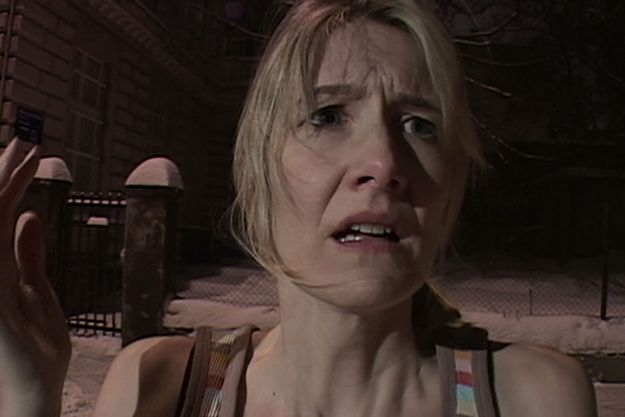
Inland Empire
MA: It’s interesting that you should note Inland Empire is the one where his cosmology is most evident, because I think it’s also his most terrifying film. Perhaps you’d like to share your amazing anecdote of seeing it in David Lynch’s screening room.
DL: I had an unusually terrifying experience with it. I was on assignment for the Times to write about the film. I flew out to L.A., and David was not in the country so I think he was coming late that night. I went to his compound in the Hollywood hills, which is the house where Lost Highway is shot. His assistant played me the film off a computer, and I was sitting in Lynch’s screening room. Alone. It’s a beautiful screening room, and it’s pretty funny: there’s one seat with a giant ashtray on its arm rest, and that’s David’s seat. I was told I could sit anywhere except in that seat. And the film is terrifying. It’s a true horror film, it engages with horror tropes. It’s also absolutely terrifying for reasons that you understand and don’t. And the experience of watching it alone in the Lost Highway house—another thing about the film is this idea of narratives or media as agents or vessels of transmission. Inland Empire is about a story, a film, that’s being remade. The idea is that the original story is haunted. So [in the screening room] this computer is glowing off to the side, you’re sitting there watching this terrifying film. It’s a film about the ghostliness of digital. It’s his first digital film, very digital-looking. And I kept looking over at the computer that was playing the film off a QuickTime file as I was watching it. It was just giving me the creeps, in the best possible way. It remains the most vivid and indelible viewing experience of my life.
MA: What you say about Inland Empire in the book is this idea that all stories have lives of their own. Which gets at the abject terror, because this idea that stories somehow become these sentient beings doesn’t make sense, yet you feel it on a cellular level when you watch the movie. Your limbic system is trying to process it—not wanting it to stop but also very scared.
DL: I think Rivette and some of his films do that too.
Audience member: What appeals to me about Lynch’s films is that they’re not tied down to the script in this very literal way—in ways that a lot of films are made, where the script is the primary thing that you’re following.
DL: Yes, I would agree. I think words in Lynch don’t have the usual function of exposition and moving the story along. He uses words for sound as much as for meaning. You get that in these slightly stiff and stilted lines that are often even delivered by stilted actors. It’s a very particular and unusual use of language. I think you see it in the way David speaks too. He has an odd relationship with language, and I get into this in the book. The Alphabet, one of his early short films, is about being terrorized by the letters in the alphabet. That’s not so hard to analyze. And he’s talked about how he was pre-verbal at a certain point in his life and didn’t really like to talk very much. There’s the sense that words close off meanings. For him, that’s almost the worst thing you could do.







